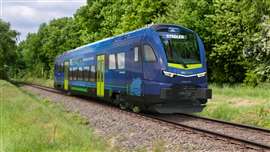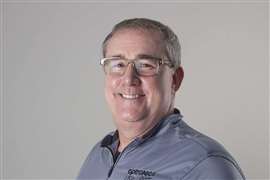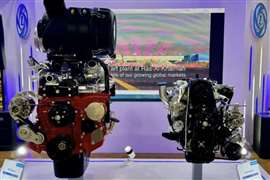Read this article in 中文 Français Deutsch Italiano Português Español
Stadler unveils prototype RS Zero at InnoTrans 2024
24 September 2024
 RS Zero hydrogen rail bus (Photo: Stadler)
RS Zero hydrogen rail bus (Photo: Stadler)
Swiss rail rolling stock manufacturer Stadler will show its prototype RS Zero at the InnoTrans trade fair, being held in Berlin from 24-27 September.
The RS Zero is the successor to the RS1 Regio-Shuttle. In production since 1996, about 500 RS1 examples are now in operation across Germany and the Czech Republic.
Instead of diesel engines, the RS Zero is powered using a hydrogen and/or battery packs, helping to reduce its carbon footprint. It was not specified whether the prototype uses a fuel cell or hydrogen internal combustion engine.
According to information from Stadler, 38% of railway lines in Germany are not electrified, while across Europe this increases to as much as 43%. Many of these lines are now disused, but put back in service they could help to move traffic from road to rail.
The company says that each RS Zero can be adapted to the respective features of a given line, whether they are electrified (with charging islands) or with hydrogen refuelling stations. This would help to create ‘an economically attractive transport service even on secondary routes with low traffic density’.
“With the RS Zero prototype we are very proud to build the next vehicle with alternative drive technology at the Berlin site after the battery-electric FLIRT Akku,” explained Jure Mikolčić, CEO of Stadler Germany. “Thanks to our technological openness, we can always offer our customers the right vehicle and make an important contribution to the transport transition.”
The RS Zero will be offered as a single or double unit, with seating for between 70 and 150 passengers. The ‘rail bus’ has an axle load of less than 18 tonnes.
Retaining the distinctive trapezoidal window design of the RS1, the RS Zero offers a low floor height and various interior design arrangements. The floor and walls of the units feature a very high percentage of renewable and recycled raw materials, including PET bottles.
The RS Zero is being launched following a difficult introduction for hydrogen rail buses. While all are now operational, several of the 27 Coradia iLint trains produced by Alston and operating on the Taunusbahn line (Wiesbaden to Frankfurt) were found to be defective.
In addition, it proved difficult to find drivers with the skills necessary to operate the trains.
Both problems caused a series of cancellations, after which the operator introduced two months of free travel to attract customers back to the service.
POWER SOURCING GUIDE
The trusted reference and buyer’s guide for 83 years
The original “desktop search engine,” guiding nearly 10,000 users in more than 90 countries it is the primary reference for specifications and details on all the components that go into engine systems.
Visit Now
STAY CONNECTED




Receive the information you need when you need it through our world-leading magazines, newsletters and daily briefings.
CONNECT WITH THE TEAM













